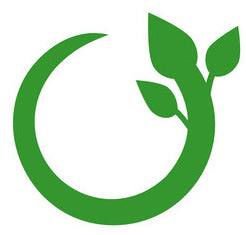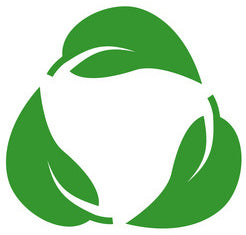Biodegradable and Compostable?
Sustainable everyday living - made simple and stylish
OwnMuse includes sustaiable and ethical products we think are useful for our readers. If you buy through links on this page, we may earn a small commission -
here are the terms and conditions.
Please share with others.

Biodegradable and Compostable:
What is the difference?
You have made the decision to: reduce waste and live more sustainably.
Be proud of your efforts.
Let's tackle... What is the difference between Biodegradable and Compostable?
Quick note: Zero waste is always the BEST solution, that is not creating waste in the first place. Reuse, refuse or use your own packaging when ever possible.
Theses two words clearly have different meanings, uses and end of life cycle.
What you need to know.

Biodegradable
Breakdown time: Average 3 weeks - 5 years
What products are biodegradable? Bamboo, cardboard, paper and organic waste. Products marked with 'Biodegradable' on the packaging.Compostable waste is biodegradable but biodegradable is NOT compostable. The following explains in more detail.
Biodegrade is defined as how a product breaks down, some products breaks down without causing harm to the surrounding environment.
Why the term 'biodegradable' gets confusing
Products are frequently classed 'Biodegradable' when they are NOT. A biodegradable product does not harm the surrounding environment during the breaking down process.
The term is often used as an umbrella term for any products which break down into the surrounding environment. Including those that release toxic gases such as carbon dioxide and methane.
"When organic waste decomposes, carbon dioxide and methane gas is created. Many manufactured goods use natural resources such as water, fuel, metal, timber in their production and this results in the emission of greenhouse gases, particularly carbon dioxide and other pollutants." stated SPREP Pacific Regional Environmental Program
'Naturally' produced carbon dioxide is an important part of the Earth's ecosystem. Respiration is a chemical reaction that occurs in all living cells, plant and animal cells, as well as environmentally such as in volcano eruptions.
'Unnaturally' produced carbon dioxide through human activities cause levels of carbon dioxide that are released in unsustainable catastrophically high levels. Deforestation, waste emissions and fossil fuels are creating changes to the Earth's climate - climate change. This is increasing greenhouse gases in the Earth's atmosphere, which is warming the planet. A
Organic waste in the wrong bin causes methane - a poisonous gas 25 times worse than carbon dioxide for the Earth's atmosphere, earth, water and air. Nasa.gov reported. "Methane is a far more active greenhouse gas than carbon dioxide, but also one which is much less abundant in the atmosphere."
BIG problem.
Combat the war on plastic: More on recycling can be found in OwnMuse' post 'Debunking the Recycling Is Ok Myth - Why 91% fails to get recycled'.
How do you know if a product is biodegradable?
1. Organic waste can but better in composting
2. Paper and cardboard products large amounts (not bleached). Smaller amounts like egg cartons can go in the compost waste.
3. Bamboo products
4. Products marked 'Biodegradable'
The word 'biodegradable' MUST be treated with extreme consumer caution and awareness.

Compostable
Breakdown time: Average 1 week - 4 months
What products to compost? Organic waste (food scraps) and products which have been indicated as compostable. This means tested to not release toxic chemicals. Paper (not bleached), 100% plant starch (no plastic) ie: corn starch, tea bags (not bleached), and egg cartons.Compostable is defined as a product that can break down in to natural elements and does not release toxic chemicals. Compostable products break down quickly averaging between 1 week and a few months. No toxic chemicals are released during the breaking down process.
The rate to which non organic compostable products break down is equal to or less than organic matter, food scraps. Composting requires an alchemical recipe to successful change the compostable waste in to a finished compostable reusable material. Micro organisms, humidity, moisture and heat are all necessary to the breaking down process.
Products made with natural planet starch such as corn, paper
Second to zero waste composting is the best waste disposal method. A practical way to care for the environment and reuse your waste. The composting waste is rich in nutrients which your garden needs to thrive. Reuse your compost waste on garden beds, vegetables patches and lawn. When you compost is dark and crumbly it is at its best. Too much? No where to add your compost? You can donate any unwanted composting to local schools and community gardens.

Banana: Home composting - NO | Industrial composting YES | Biodegradable waste ONLY if no industrial composting available. Keep out of landfill waste.
Which bin does waste go in?
What is the difference between Biodegradable and Compostable?
Ultimately the difference between compostable waste and biodegradable is compostable is turned in to a reusable product which helps plants grow.
Biodegradable whilst breaks down without harming natural surroundings it does not transform in to a reusable product like compostable waste. Choosing biodegradable products is good but compostable is better, no waste being the best choice of all.
Home composting is different to industrial composting, which is capable of processing matter as a far hotter temperature.
Should compostable and biodegradable products be processed separately?
Yes.
What not to home Compost that ARE Biodegradable
Biokashi are the exception due to their innovate system.
General home composting, things to avoid.
Some examples of organic waste which are better added to biodegradable waste.
1. Oils and fats
2. Bones and meat remains (sorry hard to type please become Vegan - even for a week!)
3. Avocado seeds and skin (they don't break down quickly)
4. Dairy (create mould which changes the process in a negative way)
5. Citrus peel (they don't break down quickly)
6. Plant and garden waste
7. Large amounts of cardboard
Waste bag decision time
You find yourself standing in the grocery aisle, with an impatient child, time is ticking by. You cascade the waste bags shelves.
Confusion sets in.
Which waste bags are the best eco choice?
Eco-waste bags materialsWhat products should your waste bags be made from?
1. 20% plant-based
2. 60% plant-based
3. 80% plant based
4. 95% recycled plastic
5. 100% plant-basedFirst things first, any of these are better than a plastic bag being made new and used once only to put landfill waste inside.
The choices that stand out are
80%-100% plant-based + 95% recycled plastic, you should use both!
Why?
Waste is different therefore waste bags need to be different.
Depending on where is goes the waste bag that holds the waste should be made from a different material.

Biodegradable or Compostable?
It is very confusing.
How do you know what you choose will break down?
How do you know if compostable bags are any good?
How do you know which waste bag manufacturer is best?
Overwhelmed!
The breakdown (pun intended) below.

Compostable
Good: The best way is to buy compostable bags that are made from 100% compostable materials.
Better: Use 100% recycled paper brown bags
Best: Don't use a bag at all, compost bins do not need a bag.

Organic
Good: When organic matter; food waste, brown unbleached paper and compostable packaging is added to the right environment it changes in to conditioned soil.
Healthy, ready for harvesting, and nutrient rich soil, ready to grow more plants.
Avoid: When the same organic matter gets put in your waste bag for landfill, it is a toxic as a petrol car's fumes.
Yes, your otherwise nutrient rich ingredient is turned in to a mix of methane and carbon dioxide.
A gas so poisonous it can kill you, the surrounding earth, pollute water and the air.
Why does good organic matter turn in to a deadly gas in landfill?
There is no natural bacteria or fungi to break it down.
Keep food out of landfill waste bags.
Food waste must go in the compost waste.
Biodegrade
Good: 20% plant-based. The higher the plant-based content the more likely it is to be biodegradable it does not mean compostable.
Better: 60% plant-based. Biodegradable is determined by how the plastic breaks down naturally, non-toxic with no pollutants.
Best: 80%+ plant-based. By the action of micro-organisms such a bacteria and fungi a natural non-toxic decomposition occurs, with and without oxygen.
Landfill waste that is not organic matter and is non-toxic, can go in biodegrade waste bags.

Recycled Plastic
Pre-consumed plastic that would of otherwise be put in landfill is given a second life when made into waste bags.
Using waste bags made from recycled plastic for landfill waste makes sense as it will securely contain your waste.
If waste must go to landfill then containing the risk of releasing toxic and poisonous gases in to the earth, air and possibly waterways is vital.
Recycled plastic waste bags will reduce the chance of poisonous gases entering the environment as it decomposes.
Landfill waste is the last resort, always seek alternative waste disposal.

Green Industry and Companies
Teaching our future leadersThe power of consumer purchasing is strong. Very strong. Industry manufacturing processes, resources, worker ethics, transportation and waste management are all under scrutiny.
Force companies to be transparent. Support green companies you know are doing their part.
Do it for you and future generations.
Together we are stronger.
Everything you do counts and matters.
Communication and sharing ways to create ecological change in our home and community is vital.
XO, OwnMuse
Please share this knowledge!
Sources:
SPREP 'Waste & Climate Change'
Nasa.gov 'The Causes of Climate Change'

This post may contain affiliate links. Please see the disclosure for more information.
Post written by Harper Sinclair. Content creator for ownmuse.com
